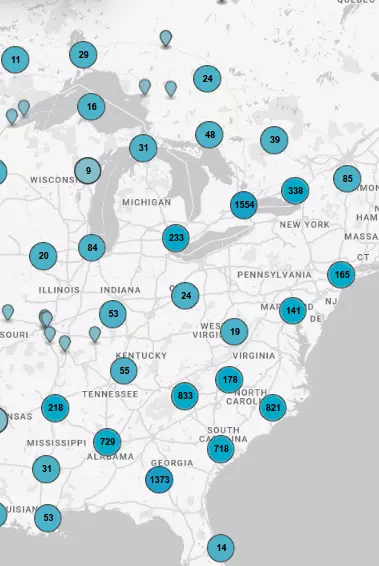Great Buffalo Lick
This site is described in the Treaty signed by the Creek and Cherokee Indians at Augusta, Georgia, in 1773. Here began the survey of the ceded lands. WPA 1936 Plaque courtesy Lat34North.com....
- lat34
William C. Dawson 1798-1856
Statesman - soldier - jurist- Freemason A native of Greene County, then on Georgia´s Indian frontier, he was educated in the law and admitted to the bar in 1818. The remainder of his...
- lat34
Sheriff L.L. Wyatt [side 2]
(Continued from other side) moonshiners resisted arrest, Wyatt regularly shot it out with them. He killed over a half dozen men, all of whom shot at him first. The most famous gunfight of...
- lat34
Sheriff L.L. Wyatt [side 1]
This 1895 jail is named for the legendary Sheriff, Loy Lee Wyatt, who enforced the laws in Greene County for fifty-two years until his death in 1977. Sheriff L.L. Wyatt was born on January...
- lat34
First Commissioner of Agriculture
In 1874, the Georgia Department of Agriculture was established by Act of the Legislature with Thomas P. Janes serving as its first Commissioner, 1874-79. Commissioner Janes, born 1823 in...
- lat34
Bishop George Foster Pierce (1811-1884)
Born February 3 in 1811 near Greensboro, George Foster Pierce was converted while at the University in Athens; in 1830 he followed his father, Dr. Lovick Pierce, into the Methodist ministry. He...
- lat34
New Hope Baptist Church
New Hope Baptist Church was constituted on January 15, 1800. Thirteen years after Greene County was created, by Rev. Joseph Baker, Rev. Thomas Mercer and others. These eleven charter members...
- lat34
Bethesda Baptist Church
When Bethesda Baptist Church was organized in 1785, it was known as Whatley´s Mill Church, and was in Wilkes County before it was added to Greene in 1802. When the present building was erected...
- lat34
Stagecoach Road
Near here ran the old Stagecoach Road from Augusta, Petersburg, Washington and Greensboro to Park´s Mill, where a toll bridge crossed the Oconee. After crossing the river the highway diverged ~...
- lat34
Fort Mathews
FORT MATHEWS About two miles South, in the fork of the Appalachee and Oconee rivers, stood Fort Mathews, built in 1793. From this fort, Thomas Houghton observed the activities of General...
- lat34
Governor Peter Early
Near here, on a bluff overlooking the river, stood the home of Governor Peter Early, one of Georgia´s great men. Born in Virginia, June 30, 1773, a graduate of Princeton, he was a lawyer,...
- lat34
Old Greene County "Gaol"
The old rock jail in the rear of the Court House is patterned after the bastilles where prisoners were housed and punished a hundred or more years ago. Built of granite about two feet thick, it...
- lat34
Unknown Confederate Dead
Forty ~ five unknown Confederate soldiers, "known but to God," are buried in this cemetery. These men died of wounds or disease in the Confederate hospitals in Greensboro, 1863 ~ 1865....
- lat34
Watson Springs
Douglas Watson, credited with being the first white man to discover Indian Springs and scout for the United States government, purchased this property from Jesse Sanders in 1786. The water of this...
- lat34
Site of Wayside Home
Here in 1862-1864 was located the Wayside home, operated by 14 gallant Confederate women of this city. More than one million meals were served to Confederate soldiers, sailors, and...
- lat34
Old Mercer
Actuated by a legacy from Josiah Penfield, Mercer University was founded here in 1833 as Mercer Institute. After considering several locations, the Trustees moved the institution to Macon in 1871...
- lat34
The Burning of Greensborough
During the early years of its settlement, Greensborough and Greene County suffered greatly from depredations committed by Indians who occupied the West bank of the Oconee River about eight miles...
- lat34
Liberty Chapel
About 1786, John Bush built a brush arbor as a community center for camp meeting at what was then called "Crackers Neck." Frown this grew liberty Chapel, Cradle of Methodism" for this section....
- lat34
Bethany Presbyterian Church
Organized in 1786, Bethany Presbyterian Church was the first church in Greene County. Dr. Francis Cummins, Dr. Francis Goulding, and other great ministers preached here. In 1886, Dr. James Woodrow...
- lat34
Greene County
This County, created by Act of the Legislature Feb. 3, 1786, is named for Maj. Gen. Nathanael Greene, the strategist who ranked second only to Gen. Washington. Born in Rhode Island in 1742,...
- lat34
